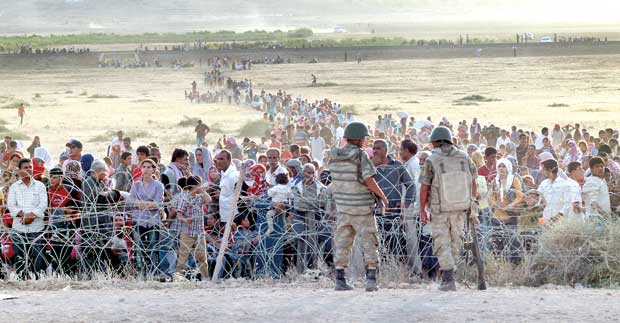
.jpg)
The world is going through its worst refugee crisis since World War II, with 42,000 people displaced every day. While Asia has its own crisis, with the plight of the Rohingya minority of Burma and Bangladesh foremost, and Sri Lankans desperate to reach Australia, these issues are dwarfed by the influx of refugees from the Middle East and Africa to Europe.
While the recent drowning of three-year-old Syrian boy Aylan Kurdi in Greek waters has aroused worldwide sympathy for the refugees, European governments are bitterly divided on the issue. UN humanitarian agencies are on the verge of bankruptcy and unable to meet basic needs such as
food and healthcare.
The crisis was triggered off by the daft decision made by George W. Bush and Tony Blair to invade Iraq in 2003. The resulting destabilization of the Middle East resulted in a number of civil wars and saw the rise of the draconian ISIS. In Syria alone, four million people have fled the murderous civil war. In addition, there are Somali and Sudanese refugees in Kenya, and Darfuris live in camps in Chad.
The current global humanitarian funding budget for all countries stands at $ 19.52 billion. But international donors have so far given only $7.15 billion. One UN source said the global budget is less than what it takes to bale out even a medium-sized bank. The World Food Programme has cut rations for 1.6 million refugees. The worst hit is in Lebanon, which now gets merely $13 a month each for food.
"While the recent drowning of three-year-old Syrian boy Aylan Kurdi in Greek waters has aroused worldwide sympathy for the refugees, European governments are bitterly divided on the issue. "
Refugees suffer horribly in undertaking hazardous crossings in overcrowded boats from Libya to the Mediterranean coast. Sexual abuse of females by smugglers is common, and thousands drown each year. In one incident six months ago, seven hundred people drowned off Libya.
Last year, The European Community (EC) decided to halt search and rescue operations in a bid to discourage refugees. As UK Foreign Office Minister Lady Anelay put it last year: “The government believes there is an unintended ‘pull factor,’ encouraging more migrants to attempt the dangerous sea crossing and thereby leading to more tragic and unnecessary deaths.”
Anti-immigrant public commentators have been bolder. British controversialist Katie Hopkins, writing in the Sun 48 hours before that mass drowning, suggested using gunboats to stop the refugee traffic. She said: “These migrants are like cockroaches. They might look a bit ‘Bob Geldof’s Ethiopia circa 1984,’ but they are built to survive a nuclear bomb.”
Despite such virulence, there is great public sympathy for the refugees across Western Europe. In the UK, Bristol has become a haven for them. In France, people are contributing books to ‘refugee libraries’ apart from food and clothing. British PM David Cameron has reluctantly agreed to shelter 20,000 refugees in the UK by 2020.
But the Danish government, in a bid to discourage refugee arrivals, put advertisements in Lebanese newspapers, giving reasons why people shouldn’t come to Denmark. It said a recent change to legislation would reduce social benefits to new arrivals by fifty per cent. Also, people hoping to gain permanent residence in Denmark would have to learn Danish to be eligible. Danish Police have closed a motorway and rail links with Germany in an effort to prevent refugees heading north to Sweden, as the crisis facing Europe spread northwards.
Denmark has changed its stance in immigration since the centre-right Liberal Party formed a minority government in June while Germany and Sweden have accepted larger numbers of refugees.
But, the greatest hostility to Mideast refugees comes from Eastern Europe. The Prime Ministers of Poland, Hungary, the Czech Republic and Slovakia have united against EU pressure, mainly from Germany, for sharing the refugee burden on a mandatory basis.
EC President Jean-Claude Juncker is considering new proposals for distributing 160,000 refugees across Europe according to a new quota system. This idea is bitterly opposed in Eastern Europe.
Hungarian Nationalist Leader Viktor Orban said he was sending the army to the borders to keep immigrants out. He has openly stated that Europe shouldn’t accept more Muslim migrants as they pose a threat to ‘Christian Europe.’
Turkey, which faces a huge refugee burden, has called upon the EU to act more decisively and responsibly. Closing borders and baton charges are not likely to deter desperate people escaping chemical bombing, beheading and arbitrary mass executions at home.

.jpg)